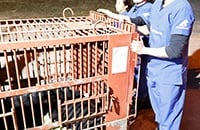Bear bile farming industry put on notice by World Conservation Congress
14 September 2012
The International Union for Conservation of Nature (IUCN) World Conservation Congress, the world’s largest and most important conservation event has passed a resolution addressing the issue of bear bile farming.
Across Asia, over 14,000 moon bears are being held in captivity on farms and milked for their bile because its believed to be effective in the practice of traditional Asian medicine despite the availability of inexpensive and effective herbal and synthetic alternatives. In China, the bears can spend more than 30 years in tiny cages and are milked regularly for their bile through crude catheters or permanently open holes in their abdomens.
The resolution encourages Korea and Vietnam to continue their efforts towards ending bear farming and calls for states that practice bear farming to work with the IUCN to close down illegal bear farms (those that do not comply with regulations), issue no further licenses or permits for farms, prevent an increase in bear numbers on existing farms, ensure no wild-caught bears are added to farms, conduct research into bear bile substitutes, and to establish a monitoring system to track trends in wild bear populations.
Importantly, the resolution calls for a scientifically independent, peer-reviewed situation analysis into whether all these points have been followed – most notably, how bear farming affects the conservation of wild bears. A report will be made to the next World Conservation Congress in 2016, possibly prompting further action at that time.
Jill Robinson MBE, Dr.med.vet. h.c., Founder & CEO, Animals Asia commented:
“The bear bile industry has been put on notice by the international community that its effects on wild bear populations are now under scrutiny and we hope to see the monitoring process beginning soon. With the conservation aspect now being fully addressed in the public arena, we are determined to continue exposing the welfare reality for thousands of bears held captive for decades on farms, with their bile extracted through open wounds cut into their gall bladders. We look forward to the day this suffering ends.”
An explanatory statement from the Bear Specialist Group of the IUCN states that the group had:
“reached the conclusion that commercial bear-farming does not constitute sustainable use. Even if farms could be made self-sustaining (by no longer restocking with wild-caught bears), the increased demand for wild bile created by the surplus of farmed bile has fueled the over-exploitation of wild bears.
“Wild bear populations are declining dramatically, due mainly to poaching, throughout the range where bear-farming occurs, and some local populations have been extirpated. Indeed, the decline of bear species in countries where bear-farming is taking place is much more rapid than in any other part of the world.”
Held every four years, the World Conservation Congress aims to improve how we manage our natural environment for human, social and economic development. The 2012 World Conservation Congress started on 6 September and finishes tomorrow, in Jeju, Republic of Korea. Attendees are leaders from government, the public sector, non-governmental organisations, business, UN agencies and social organisations.
BACK




 5 reasons the dog meat trade must end
5 reasons the dog meat trade must end
 New year, new home for Christmas the Bear!
New year, new home for Christmas the Bear!
 Veterinary welfare training – pain management
Veterinary welfare training – pain management